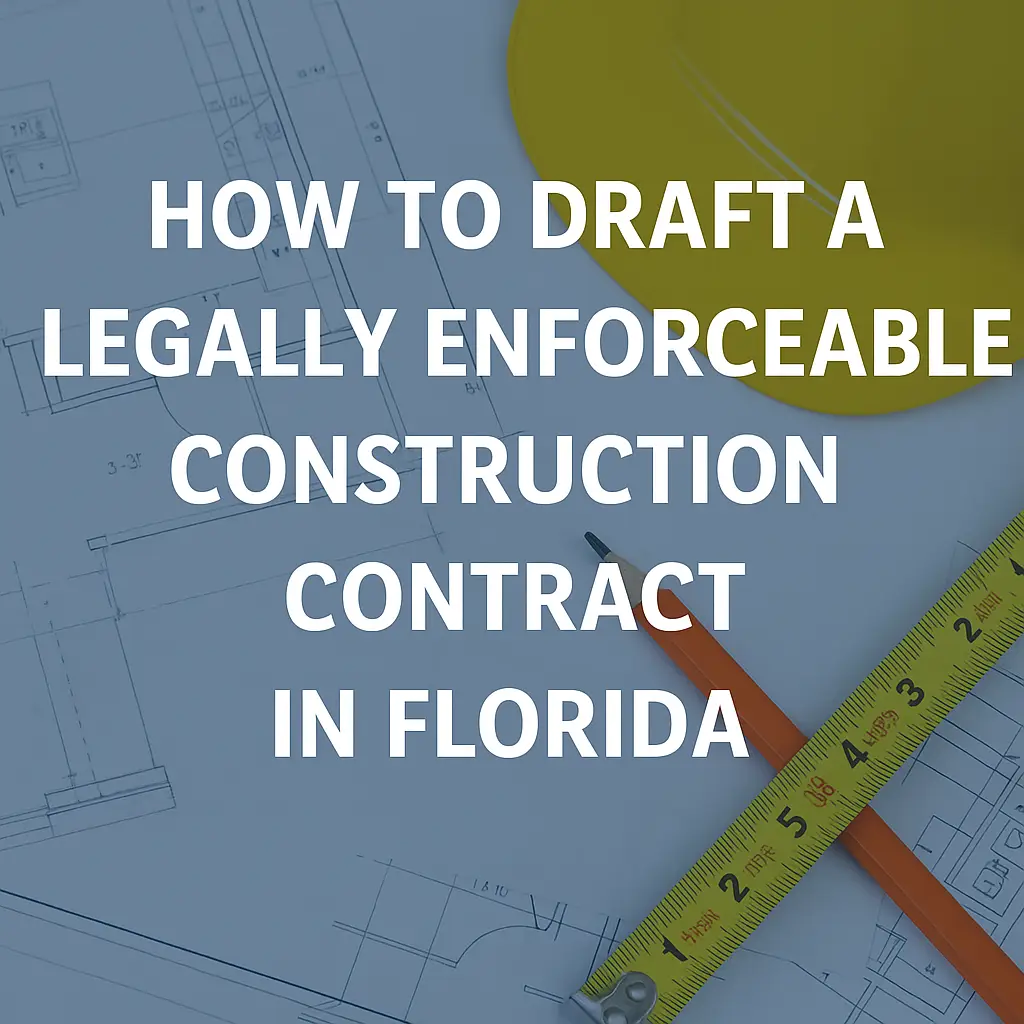A well-drafted construction contract isn’t just paperwork—it’s your first and best defense against nonpayment, delays, and costly legal disputes. In Florida, having a legally enforceable contract is especially critical due to the state’s robust lien laws, DBPR licensing regulations, and frequent disputes between owners, contractors, and subcontractors.
At Douglas Firm, we help Florida contractors, subcontractors, and owners draft, negotiate, and enforce contracts that protect their business and comply with state law. Here’s a comprehensive guide to help you avoid the most common construction contract pitfalls.
Must-Have Clauses in Every Florida Construction Contract
Regardless of project size, every construction contract in Florida should include these key terms:
- Scope of Work: Define exactly what work is included—and what isn’t.
- Payment Terms: State the contract price, payment milestones, and what constitutes a valid payment application.
- Timeline: Include start dates, substantial completion deadlines, and consequences for delay.
- Change Orders: Require written authorization for any change in scope, cost, or time.
- Termination: Clarify how and when either party can terminate the contract.
- Lien Rights: Address compliance with Florida’s Construction Lien Law (Chapter 713).
- Dispute Resolution: Decide whether disputes will go to court, mediation, or arbitration.
Related Resource: Account Receivable Collections & Payment Disputes
Avoid Boilerplate Templates Without Legal Review
Using a form you found online or reusing a generic agreement might seem efficient, but it’s a recipe for disaster. Many templates lack Florida-specific lien disclosures, regulatory compliance language, or are written from the owner’s perspective and leave contractors exposed.
Why it’s risky:
- Missing mandatory disclosures can invalidate lien rights.
- Poorly defined scope or payment terms lead to disputes.
- Incomplete terms can trigger DBPR complaints.
Related Resource: DBPR Complaints | Unlicensed Contracting Defense
Residential Contracts: Special Requirements Under Florida Law
If you’re contracting directly with a homeowner for work on residential property, your contract must meet additional requirements to be enforceable and protect your lien rights.
Mandatory Disclosures for Residential Construction Contracts:
- Lien Law Disclosure: Florida Statute §713.015 requires that residential contracts include specific language warning homeowners of their potential liability if the contractor fails to pay subcontractors or suppliers.
- Recovery Fund Notice: Florida Statute §489.1425 mandates that all contracts entered into by a licensed contractor must include notice of the availability of the Florida Homeowners’ Construction Recovery Fund.
- License Disclosure: State law requires contractors to include their license number and business information clearly on the contract.
- 3-Day Right to Cancel: Florida Statute §501.025 and the Federal Trade Commission’s Cooling-Off Rule (16 CFR §429) require that contracts solicited and signed at a homeowner’s residence must provide the homeowner with a written right to cancel the contract within three business days.Sample Clause:“You, the buyer, may cancel this contract at any time prior to midnight of the third business day after the date of this transaction. If you wish to cancel, you must provide written notice of cancellation to the contractor at the address specified in this agreement.”
Failure to include these terms can lead to:
- Loss of lien rights
- Inability to enforce the contract in court
- DBPR fines or disciplinary action
Related Resource: Construction and Electrical Qualifier Agreements
Different Contracts for Different Roles
Not all parties need the same contract. Florida contractors should tailor their contracts depending on their role in the project.
- General Contractors need detailed agreements with owners and separate subcontracts.
- Subcontractors need strong contracts protecting them from pay-when-paid risks and delays.
- Owners should ensure their contractor provides valid license and insurance info and signs a written agreement with lien disclosures.
Each contract should address responsibilities, insurance, indemnification, lien releases, and default provisions.
Enforceability: What Makes a Contract Legally Binding in Florida?
For a construction contract to be enforceable in Florida, it must meet certain requirements:
- Offer and Acceptance: Both parties must agree to the same essential terms.
- Consideration: Each party must exchange something of value.
- Competent Parties: Both parties must have the legal capacity to contract.
- Legal Purpose: The contract must not require any illegal activity (e.g., unlicensed contracting).
- Written Format (in most cases): Oral contracts are enforceable in some cases, but written contracts are required to preserve lien rights and prove terms.
Bonus Tip: Always keep a signed copy of the contract. If work begins before signatures are obtained, your legal position is weakened.
Conclusion
A strong construction contract is the foundation of a successful project and a healthy business. By including the right clauses, tailoring agreements to each party’s role, and complying with Florida-specific laws—especially for residential work—you can avoid disputes, preserve your lien rights, and protect your license.
If you need help drafting or reviewing a construction contract in Florida, Douglas Firm is here to help. We work with contractors, owners, and subcontractors to create clear, enforceable agreements that reduce risk and protect your bottom line.
Douglas Firm — Trusted Legal Advisors for Florida’s Construction Professionals.
